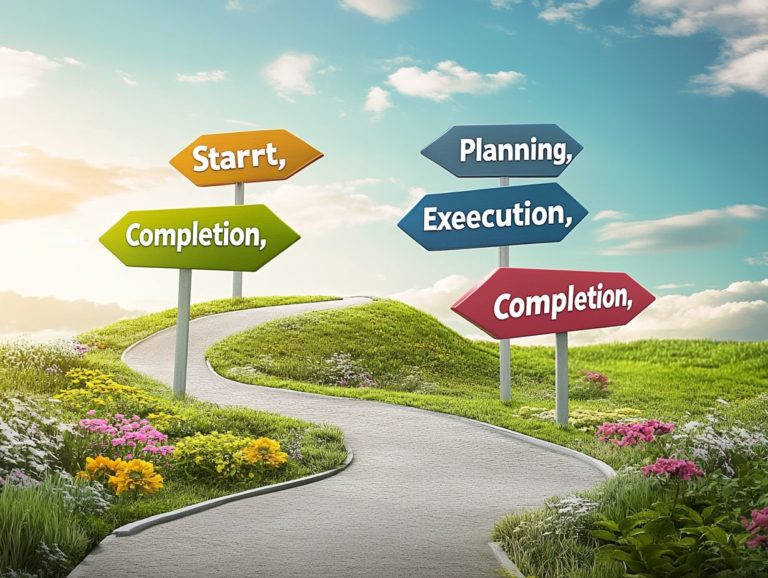How to Cultivate a Growth Mindset for Goals
In today s fast-paced world, your ability to adapt and grow is more crucial than ever. Embracing a growth mindset the belief that your abilities and intelligence can be developed unlocks a realm of endless possibilities.
This article delves into the definition and core principles of a growth mindset, showcasing its benefits as you strive to achieve both personal and professional goals. It identifies common triggers that may lead to a fixed mindset and offers practical strategies for nurturing your growth. It also provides tips for maintaining this mindset in the face of challenges.
Start your exciting journey to unlock your full potential today!
Contents
- Key Takeaways:
- Understanding Growth Mindset
- Benefits of a Growth Mindset
- How it Can Help You Reach Your Goals
- Understanding Your Fixed Mindset Triggers
- Strategies for Cultivating a Growth Mindset
- Setting and Achieving Goals with a Growth Mindset
- Maintaining a Growth Mindset for Continued Success
- Frequently Asked Questions
Key Takeaways:

- Cultivating a growth mindset is crucial for achieving our goals in life. It involves recognizing and challenging our fixed mindset triggers, such as negative self-talk and limiting beliefs.
- By adopting a growth mindset, we can unlock our potential and overcome challenges that come with pursuing our goals. It empowers us to embrace learning and persist in the face of obstacles.
- Practical steps, such as reframing setbacks as opportunities for growth and setting specific goals, can help us cultivate a growth mindset. With this mindset, we can achieve success and maintain motivation despite setbacks.
Understanding Growth Mindset
Understanding the growth mindset is essential for anyone keen on personal development and reaching their goals. It fundamentally transforms how you perceive learning opportunities and life s challenges.
Coined by psychologist Carol Dweck, this concept emphasizes that your abilities and intelligence can be cultivated through dedication and hard work. In contrast to a fixed mindset, where you might believe your qualities are set in stone, this perspective fosters progress.
Embracing a growth mindset enhances your mental resilience and encourages a proactive approach to overcoming obstacles. This shift ultimately leads you toward a more successful and fulfilling life.
Definition and Principles
The definitions and principles of a growth mindset center on the belief that your abilities can be developed through dedication and hard work. This stands in stark contrast to a fixed mindset, which sees abilities as unchangeable.
This fundamental difference lays the foundation for understanding personal development and resilience when faced with challenges. A growth mindset enables you to view failures as valuable learning opportunities and nurtures a genuine love for learning.
Those confined within a fixed mindset may shy away from challenges, worried that any misstep will reveal their perceived limitations. Ultimately, how you perceive your abilities shapes your motivation and influences how you navigate life’s obstacles.
Benefits of a Growth Mindset
Embracing a growth mindset brings a wealth of benefits that can profoundly elevate both your personal and professional life. It transforms your approach to challenges and setbacks, ultimately enabling you to reach your goals.
Research from experts like Ashley Pe a and insights from Verywell Mind underscore the positive effects of a growth mindset on mental health. This mindset allows you to welcome challenges instead of avoiding them.
It builds your ability to bounce back and creates a feedback loop that fuels continuous improvement, turning every learning opportunity into a stepping stone toward your success.
Take the first step today!
How it Can Help You Reach Your Goals
A growth mindset is essential for achieving your goals, as it nurtures mental resilience and encourages an active approach to personal development. To cultivate this mindset, learn how to develop a resilient mindset that enables you to view challenges as stepping stones rather than stumbling blocks, treating setbacks as valuable lessons.
When you believe in your ability to improve, you become more open to taking risks and venturing beyond your comfort zones. When faced with obstacles, you display remarkable mental toughness, allowing you to recover swiftly and persist in your endeavors.
This resilience not only elevates your overall performance but also inspires those around you to embrace similar attitudes, cultivating a supportive environment where collective success is a shared reality.
Understanding Your Fixed Mindset Triggers
Understanding your mindset is the first step to change. Identifying your fixed mindset triggers is a crucial part of your personal development journey. Being aware helps you spot and confront the negative self-talk and limiting beliefs that hinder your ability to reach your fullest potential.
These triggers can take on various forms, reminiscent of the pessimism embodied by Eeyore or the self-doubt even someone as accomplished as Taylor Swift can experience. By becoming cognizant of these patterns, you can start to challenge them and replace them with a more enabling growth mindset one that fosters resilience and paves the way for your success.
Recognizing Negative Self-Talk and Limiting Beliefs
Recognizing negative self-talk and limiting beliefs is crucial for overcoming a fixed mindset and fostering your personal development.
By understanding how these destructive thought patterns create barriers to your progress, you can begin to dismantle the fears and doubts that hold you back from reaching your true potential. These thoughts often surface as a critical inner voice, whispering that you aren t capable or deserving of success. To combat this, consider practicing mindfulness, which is being aware of your thoughts and feelings; it allows you to identify and confront these harmful narratives head-on.
Challenging these beliefs with positive affirmations can truly transform your mindset, enabling you to embrace a growth-oriented perspective. By focusing on progress rather than perfection, you can cultivate resilience and confidence in your unique abilities.
Strategies for Cultivating a Growth Mindset
To cultivate a growth mindset, you must implement effective strategies that facilitate a mindset shift and build your confidence, ultimately enhancing your mental resilience and ability to tackle challenges, as outlined in how to develop resilience in pursuing goals.
- Mindfulness practice, championed by experts like Dr. John Delony, helps establish a supportive feedback loop that reinforces positive thinking patterns while diminishing the weight of negative self-talk.
- Engaging in these strategies enables you to view each challenge as a valuable learning opportunity, transforming obstacles into stepping stones for growth.
- Embrace challenges and feel the thrill of your growth journey!
Practical Steps to Shift Your Mindset
Practical steps to shift your mindset involve taking tangible actions that help you transition from a fixed to a growth mindset, ultimately enhancing your mental resilience.
One effective way to begin this transformation is to embrace challenges rather than shying away from them. Consider setting small, achievable goals that promote incremental improvements, allowing you to experience a sense of accomplishment along the way.
Actively seeking feedback can be a game-changer; view it as a valuable opportunity for growth rather than mere criticism. Engaging in reflective practices, such as journaling, can illuminate thought patterns that may be hindering your progress.
Surrounding yourself with a supportive community that encourages growth-oriented discussions can further solidify this mindset shift, making it easier for you to adopt new attitudes and behaviors.
Setting and Achieving Goals with a Growth Mindset
Setting and achieving goals with a growth mindset can profoundly transform your approach to both personal and professional aspirations. It enables you to embrace learning, growth, and mental resilience as essential elements of your journey. Understanding the impact of mindset on goal achievement aligns your goals with the core principles of a growth mindset, highlighting the significance of adaptability and persistence when faced with challenges.
Financial mentors, such as Dave Ramsey, skillfully illustrate the power of a growth mindset in attaining financial success, helping you redefine your objectives and refine your strategies along the way.
Applying Growth Mindset to Goal-Setting Process

Applying a growth mindset to your goal-setting process allows you to view challenges as valuable learning opportunities instead of mere obstacles on the path to success. For more insights, check out this guide on how to encourage a growth mindset in kids. This perspective nurtures resilience and invites experimentation, enabling you to embrace setbacks as essential elements of your journey.
When you encounter obstacles, rather than succumbing to defeat, assess your approach, adapt your strategies, and persist with renewed determination. This not only sharpens your problem-solving skills but also sparks increased creativity and innovation. By concentrating on the journey of growth instead of just the end goal, you cultivate a more positive and productive environment that celebrates progress.
Ultimately, integrating a growth mindset transforms goal-setting from a simple achievement of targets into a fulfilling, developmental experience that enriches your personal and professional life.
Maintaining a Growth Mindset for Continued Success
Maintaining a growth mindset for sustained success demands ongoing effort and unwavering commitment, particularly when navigating setbacks and finding motivation in challenging times. Take inspiration from figures like Thomas Edison, who wisely remarked, “I have not failed. I’ve just found 10,000 ways that won’t work.” This perspective serves as a powerful reminder of the resilience that a success-oriented mindset embodies.
Embracing practices like a social media detox significantly reduces distractions, allowing you to concentrate on your personal growth and accomplishments.
Overcoming Setbacks and Staying Motivated
Overcoming setbacks and staying motivated are essential elements for cultivating a growth mindset and achieving long-term success.
As you face challenges, develop strategies that foster resilience and maintain a positive outlook. This means reframing failures as opportunities for learning, allowing you to extract valuable lessons from each experience. Surrounding yourself with supportive peers and mentors can provide encouragement and fresh perspectives during tough times.
Establish achievable goals, celebrate small victories, and practice self-compassion being kind to yourself during tough times to fuel your sustained motivational drive. Embracing a success mindset not only equips you with the tools to navigate obstacles but also ignites your ambition to reach new heights of accomplishment.
Frequently Asked Questions
What is a growth mindset?
A growth mindset is a belief that your abilities and intelligence can be developed and improved through hard work, persistence, and learning from failure.
How can I cultivate a growth mindset for my goals?

You can cultivate a growth mindset for your goals by embracing challenges, persisting through setbacks, learning from criticism, and finding inspiration in the success of others.
Why is a growth mindset important for achieving goals?
A growth mindset is important for achieving goals because it allows you to see setbacks and failures as opportunities for growth, helping you stay motivated and focused on your long-term objectives.
What are some strategies for developing a growth mindset?
Some strategies for developing a growth mindset include seeking out challenges, learning from mistakes, embracing the learning process, and seeking feedback and constructive criticism.
Start your journey today embrace a growth mindset and watch your goals transform!
How can a growth mindset help me overcome obstacles?
A growth mindset encourages you to see challenges as chances to learn and grow. It helps you believe in your ability to improve and succeed.
Can a growth mindset be cultivated at any age?
Yes! You can develop a growth mindset at any age. It s never too late to change how you think about your goals and challenges.






